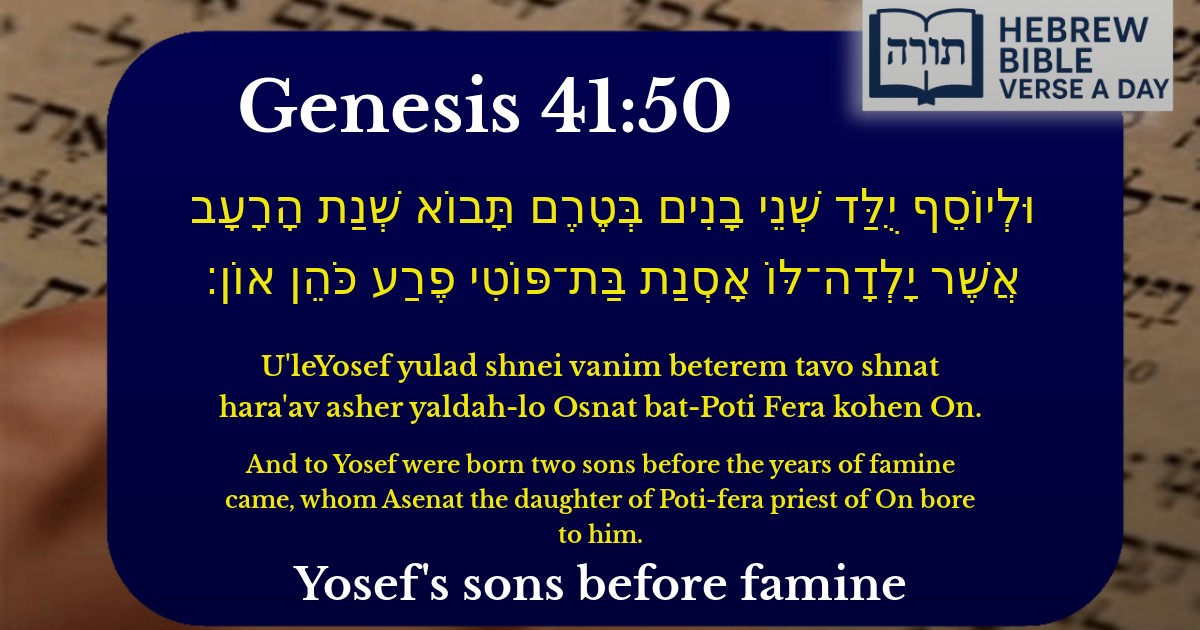Join Our Newsletter To Be Informed When New Videos Are Posted
Join the thousands of fellow Studends who rely on our videos to learn how to read the bible in Hebrew for free!
Hebrew Text
וּלְיוֹסֵף יֻלַּד שְׁנֵי בָנִים בְּטֶרֶם תָּבוֹא שְׁנַת הָרָעָב אֲשֶׁר יָלְדָה־לּוֹ אָסְנַת בַּת־פּוֹטִי פֶרַע כֹּהֵן אוֹן׃
English Translation
And to Yosef were born two sons before the years of famine came, whom Asenat the daughter of Poti-fera priest of On bore to him.
Transliteration
U'leYosef yulad shnei vanim beterem tavo shnat hara'av asher yaldah-lo Osnat bat-Poti Fera kohen On.
Hebrew Leining Text
וּלְיוֹסֵ֤ף יֻלַּד֙ שְׁנֵ֣י בָנִ֔ים בְּטֶ֥רֶם תָּב֖וֹא שְׁנַ֣ת הָרָעָ֑ב אֲשֶׁ֤ר יָֽלְדָה־לּוֹ֙ אָֽסְנַ֔ת בַּת־פּ֥וֹטִי פֶ֖רַע<sup class="footnote-marker">*</sup><i class="footnote">(בספרי תימן פּֽוֹטִיפֶ֖רַע בתיבה אחת)</i> כֹּהֵ֥ן אֽוֹן׃
וּלְיוֹסֵ֤ף יֻלַּד֙ שְׁנֵ֣י בָנִ֔ים בְּטֶ֥רֶם תָּב֖וֹא שְׁנַ֣ת הָרָעָ֑ב אֲשֶׁ֤ר יָֽלְדָה־לּוֹ֙ אָֽסְנַ֔ת בַּת־פּ֥וֹטִי פֶ֖רַע*(בספרי תימן פּֽוֹטִיפֶ֖רַע בתיבה אחת) כֹּהֵ֥ן אֽוֹן׃
🎵 Listen to leining
Parasha Commentary
📚 Talmud Citations
This verse is not quoted in the Talmud.


Background of the Verse
The verse (Bereshit 41:50) describes the birth of Yosef's two sons, Menashe and Ephraim, before the years of famine began in Egypt. Their mother was Asenat, the daughter of Poti-fera, the priest of On. This event is significant as it marks the beginning of Yosef's establishment in Egypt and the fulfillment of Hashem's promise to Avraham that his descendants would be strangers in a land not their own (Bereshit 15:13).
Asenat's Identity
Rashi (Bereshit 41:45) explains that Asenat was the daughter of Dinah, whom Shechem had fathered, and was later adopted by Poti-fera (identified by Chazal as Potiphar). This interpretation is based on the Midrash (Bereshit Rabbah 80:11), which states that Yaakov sent a ketonet passim (ornamented tunic) with her when she was sent away, and this is how Yosef recognized her as his sister's daughter. The name "Asenat" is interpreted as coming from the root ס-נ-ה, meaning "hatred," because people hated her due to her illegitimate birth.
Poti-fera's Role
The title "Poti-fera, priest of On" raises questions about his identity. The Ramban (Bereshit 41:45) notes that On (Heliopolis) was a center of idolatry in Egypt, and Poti-fera was likely a high-ranking priest in that cult. Despite this, Yosef married his daughter, which the Midrash (Tanchuma Vayeshev 8) explains was part of Divine Providence to elevate Yosef to a position where he could save his family.
Timing of the Births
The verse emphasizes that the children were born "before the years of famine came". The Kli Yakar (Bereshit 41:50) explains that this timing was providential—Yosef's sons were born during a time of plenty so they would not be associated with suffering. Additionally, the Sforno notes that this detail highlights Yosef's foresight and stability before the crisis, demonstrating his wisdom in preparing for the future.
Spiritual Significance